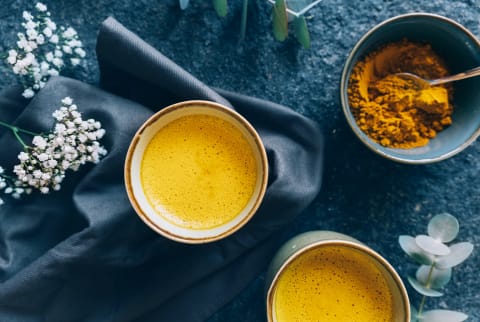Advertisement
Want To Support Your Brain Health & Neuroplasticity? How Turmeric Can Help*


There are so many ways to support brain health and harness neuroplasticity as we get older, from getting enough omega-3s to staying active and prioritizing quality sleep. And if you're familiar with all the benefits of turmeric, you'll be happy to know it, too, can support your brain as you age.* Here's what to know, according to experts.
How turmeric supports neuroplasticity
As health and science journalist and New York Times bestselling author Max Lugavere explained on a recent episode of the mindbodygreen podcast, turmeric boasts neuroprotective properties1 and contains something called aromatic turmerone, a compound that's been shown in preclinical evidence to support the production of neural stem cells.* "So [it's] good for supporting neuroplasticity, which is important for anybody concerned with brain health,"* he said.
Board-certified nutrition specialist and gut health expert Brooke Scheller, DCN, CNS, adds that "Turmeric can help to build, restore, and re-establish new pathways, new habits, and really the learning and adaptation of our brain."* She notes that turmeric also helps to combat free radicals in the body2, which is good news for your brain.* Plus, one of its key bioactives, curcumin, has been shown in animal studies to help normalize the activity of neurotransmitters involved in the production of feel-good hormones, like serotonin and dopamine3.*
"So turmeric is potentially supporting neurotransmitter production as well, and again, reducing these overall stress markers that make our brains have more difficulty in functioning or processing,"* Scheller explains.
The best way to get more of it
Both Lugavere and Scheller recommend turmeric for anyone looking to mind their brain health, but the caveat is, the ingredient is not always readily absorbed by the body and thus, it's more difficult to reap the full range of benefits.
And that's why mindbodygreen developed turmeric ginger+, which features 500 milligrams of full-spectrum turmeric root extract delivered with polar-nonpolar-sandwich (PNS) technology. PNS technology is clinically shown to enhance turmeric's bioavailability tenfold, to help you get as many brain-supporting benefits from the root as possible.*†
And beyond that, turmeric ginger+ also contains other potent ingredients: full-spectrum ginger root extract (which also uses PNS technology) and piperine from black pepper fruit extract, to ensure your body can fully take advantage of the antioxidant actions of these plant extracts.
The takeaway
We could all do more to support our brain health and neuroplasticity as we age, and getting more turmeric into your day-to-day is one way to do that. Just make sure if you're supplementing it, you're going for a highly bioavailable option with research-backed ingredients, like turmeric ginger+.*
